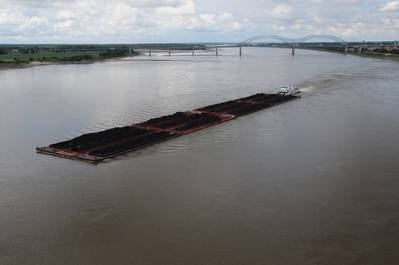Routine USACE Levee Work Halts Mississippi Traffic
Fully loaded barges headed to export market abruptly halted.
Waterways Council, Inc. (WCI) and its agricultural and other commodity shipper members and towboat operators are reacting to the U.S. Army Corps of Engineers’ decision to perform, over the next 13 days, routine work that involves laying concrete mats that protect the river bank for flood protection. This requires traffic restrictions for towboats moving barges and other vessels while the mats are laid.
A three-mile stretch of the Mississippi River near Memphis at Mile Marker 632-635 was closed at 6 a.m. this morning for the Corps to begin this work and additionally to survey the area to determine if barges could traverse the channel during daylight hours safely. The Corps has committed to clear the queue of waiting towboats, currently 22, tonight. Tomorrow the Corps will move navigation buoys to widen the channel, and then send a test tow through the area north-bound to see if it is feasible to move barge tows safely. The Corps will make a final decision about continuing or postponing this work sometime this weekend. The Corps would like to allow north-bound traffic to move during day-light hours and south-bound traffic to move at night.
With little proper notice to operators and shippers, the Corps’ work performed at this time has impeded transportation on the nation’s busiest waterways during the most critical part of this record harvest season.
Tows of between 30-40 barges fully laden with grain are moving down-river to the export market, and salt and other commodities are moving up-river. With harsh winter weather closing in on the upper river system, the industry is racing against time to cycle barges as quickly as possible to transport as much grain as weather allows.
Waterways Council, Inc. is the national public policy organization advocating a modern and well-maintained national system of ports and inland waterways. Its members include shippers and receivers of bulk commodities, waterways carriers, ports, shipping associations, agriculture groups, organized labor, advocacy groups, and environmental and conservation organizations. For more information on WCI, please visit www.waterwayscouncil.org.













